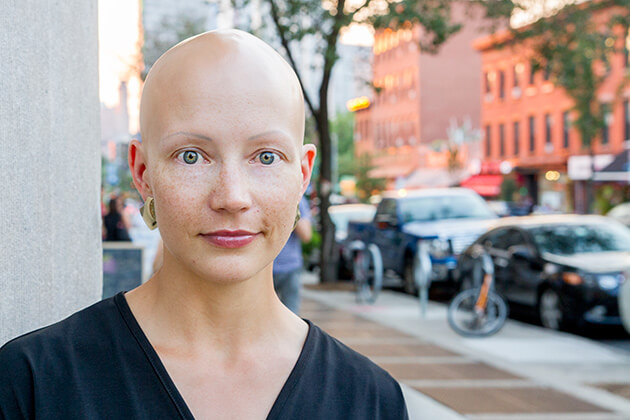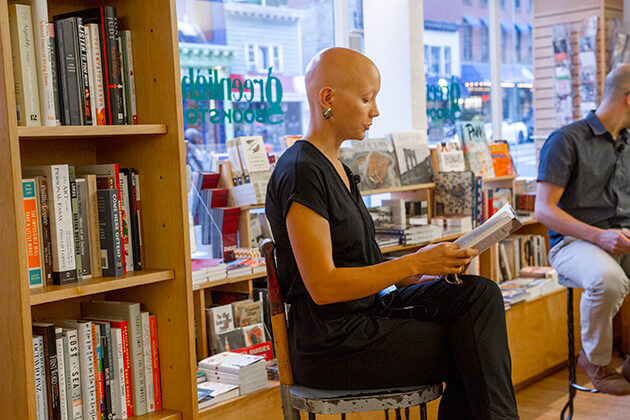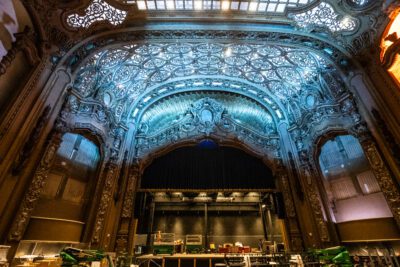Her Dark Reality: On Helen Phillips and the Dystopic World of The Beautiful Bureaucrat


Helen Phillips
photo by Jane Bruce
A windowless office. Pinkish walls covered in faint, dirty handprints. A pomegranate surrounded by shattered porcelain. Helen Phillips’s third book and first novel, The Beautiful Bureaucrat, found its origins in these images: a 100-page list of them. “The plot was the very last thing to fall into place,” she said at Greenlight Books on Monday, August 17. She and fellow Henry Holt author, Gabriel Urza, were in conversation with their shared editor, Sarah Bowlin. Phillips laughed. “Pretty backwards.”
It’s a short book—180 pages—but those pages are compact and dreamy and terrifying. A couple, Josephine and Joseph, have moved from “the hinterland,” a suburban no-place, to a grim and uncanny city. As they move from one damp, bug-infested sublet to another, they struggle to make sense of their new status as urbanites and new jobs as—yes—bureaucrats. Who is the waitress with the snake tattoo who gives all her customers an identical fortune? What is the database Josephine must update but never consider the nature of? Whose handprints are those on the walls?
“I always have this buzzing, humming awareness of a darker reality under the surface of things,” Phillips said. “The nightmare version that is dwelling there.”
Both the peculiarities and the featurelessness of the city, the bureaucracy, the characters create this bad dream quality: the story is both over- and unfamiliar. Of course this is happening; of course this could never happen. Phillips identified Kafka as one of her pole stars, and the labyrinth of hallways and manners Josephine must navigate at her new job echoes the dread omnipresent in The Trial. “Bureaucracy is really funny,” she also insisted. “You have to laugh at it.”
There’s also an element of Lynchian body horror in the novel: none of Josephine’s sublets would look out of place in Eraserhead. The pomegranate, when the image does appear, is jabbed at with a steak knife. “Thick red blobs of liquid shot out of the fruit, spraying the wall and the cabinets.” A plate flips over. At her job interview, Josephine is approvingly evaluated by a person behind mirrored sunglasses, her potential supervisor: “good skin, good eyes.” But after a few weeks on the job—typing out long strings of numbers, cross-checking paper files with electronic ones, inputting dates—her eyes start to go scratchy, red, and her vision significantly worsens. I found myself wondering whether the person behind the impenetrable sunglasses had eyes at all.
Josephine slips into paranoia. Her husband disappears for long stretches. The post office keeps failing to deliver a mysterious package. A man or men in a gray sweat suit appear everywhere. The snack machine at work—itself very difficult to find—will vend only chalky, lavender-flavored breath mints. (I promise that last one is very sinister in context.) “Josephine’s uncertainty in these moments is due…to her perception of multiple simultaneous meanings,” Phillips said in an email conversation with Karen Russell, “of the fragility of language, of the complexity of any single human interaction—all the overlapping, indecipherable layers of give-and-take, push-and-pull, truth-telling and truth-twisting.” Whether her husband’s absences are due to super or merely natural reasons, the fact of them is alarming on its own.


Phillips reading at Greenlight Books
“I set out to write a poetic thriller,” Phillips said at Greenlight. “What is that even?” she asked, laughing again.
It was Bowlin’s, Phillips’ editor, first time hearing the phrase and Phillips supposed it was a strategic omission. “Don’t call anything poetic,” she advised the audience, several of whom were her students at Brooklyn College, where she is a professor of creative writing. Phillips mentioned the Coen brothers as a model—“they take a Western and make it weird”—for how she thought about genre: participating in but also poking fun at its conventions. She named authors who helped model for her world building and novels of big ideas—Italo Calvino, Jorge Luis Borges, Haruki Murakami, Kurt Vonnegut—as well as those who helped her push towards condensation and precision in her language—Lydia Davis, Amy Hempel.
“I had a 350-page draft,” she said of the early stages of The Beautiful Bureaucrat. “I almost came close to abandoning it.” She had to cut almost 200 manuscript pages and switch the voice from first person—the novel was originally narrated by Josephine—to third. “I joke that this book is half science fiction, half autobiography.”
The shift in perspective allowed her to gain some useful distance between her and her protagonist. Still, elements from Phillips life filtered into it. When Josephine tacks a calendar to her smudgy office walls, her supervisor—the person in sunglasses and with (equally ominous) terrible, rotting breath—comes in to scold her:
“Oh dear,” The Person with Bad Breath said, pointing a grayish finger at the calendar. “You mustn’t hang anything on the walls. Otherwise the painters might get discouraged when they come.”
The work order for a new coat of paint had been put it, but eight years ago. When her supervisor isn’t looking, Josephine puts the calendar back up. Phillips remembered a time—before she taught at Brooklyn College—where the same thing happened to her. “It only takes a minute to take decorations down from walls!” she said. “How would painters be discouraged by that?”
In addition to mining her early employment history, she also did “a lot of census-related research, research related to government records.” She had to look up what year typewriters were invented. (Josephine sneaks a peak at some old files.)
Phillips also spoke a little about how her writing life has changed since having children. (Josephine, in the novel, is trying very hard to conceive.) “Before I was a mother, it was all perfectly lovely,” she said. She had specific routines and long stretches of time to write. With kids at home, she has one hour day. But she uses it. Phillips feels like this has focused her. “Never underestimate what you can gain by taking some things away,” she said, speaking of her drafting process but also, perhaps, of her schedule.
But the most useful tool was a different kind of time. “The best editor you can have is a future version of yourself,” Phillips said. If time was the essential ingredient for this frightening book of fiction, we best heed her words.
You might also like 




















